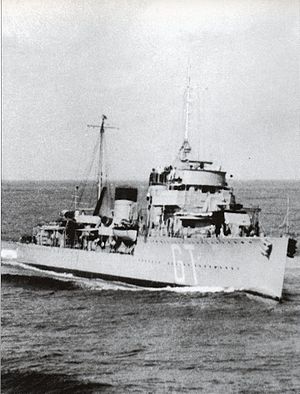HNLMS Van Ghent (1926)

Van Ghent in 1934
|
|
| History | |
|---|---|
| Name: | Van Ghent |
| Namesake: | Willem Joseph van Ghent |
| Builder: | KM De Schelde |
| Laid down: | 28 August 1925 |
| Launched: | 23 October 1926 |
| Commissioned: | 31 May 1928, as De Ruyter |
| Renamed: | Van Ghent, 1934 |
| Fate: | Scuttled, 15 February 1942 |
| General characteristics | |
| Class and type: | Admiralen-class destroyer |
| Displacement: |
|
| Length: | 98.15 m (322 ft 0 in) |
| Beam: | 9.53 m (31 ft 3 in) |
| Draft: | 2.97 m (9 ft 9 in) |
| Propulsion: |
|
| Speed: | 36 knots (67 km/h; 41 mph) |
| Range: | 3,200 nmi (5,900 km; 3,700 mi) at 15 kn (28 km/h; 17 mph) |
| Complement: | 149 |
| Armament: |
|
| Aircraft carried: | 1 × seaplane |
HNLMS Van Ghent (Dutch: Hr.Ms. Van Ghent) (originally named De Ruyter) was an Admiralen-class destroyer built for the Royal Netherlands Navy in the 1920s. The destroyer served in the Netherlands East Indies but was wrecked after running aground in 1942.
In the mid-1920s, the Netherlands placed orders for four new destroyers to be deployed to the East Indies. They were built in Dutch shipyards to a design by the British Yarrow Shipbuilders, which was based on the destroyer HMS Ambuscade, which Yarrow had designed and built for the British Royal Navy.
The ship's main gun armament was four 120 millimetres (4.7 in) guns built by the Swedish company Bofors, mounted two forward and two aft, with two 75 mm (3.0 in) anti-aircraft guns mounted amidships. Four 12.7 mm machine guns provided close-in anti-aircraft defence. The ship's torpedo armament comprised six 533 mm (21.0 in) torpedo tubes in two triple mounts, while 24 mines could also be carried. To aid search operations, the ship carried a Fokker C.VII-W floatplane on a platform over the aft torpedo tubes, which was lowered to the sea by a crane for flight operations.
The destroyer De Ruyter was laid down on 28 August 1925 at Koninklijke Maatschappij De Schelde, Vlissingen, was launched on 13 October 1926 and commissioned on 31 May 1928.
She and her sister Evertsen left the Netherlands on 27 September 1928 for the Dutch East Indies.
29 July 1929 De Ruyter her sister Evertsen, the cruiser Java and the submarines K II and K VII left Surabaya and steamed to Tanjung Priok. At Tanjung Priok the ships waited for the royal yacht Maha Chakri of the king of Siam and the destroyer Phra Ruang. After this the ships without the submarines visited Bangka, Belitung, Riau, Lingga Islands, Belawan and Deli. On 28 August that year they returned in Tanjung Priok. On 31 August that year she participates in a fleet review at Tanjung Priok. The review was held in honor of the Dutch Queen Wilhelmina of the Netherlands who was born that day. Other ships that participated in the review where the destroyer Evertsen and the cruiser Java.
...
Wikipedia
